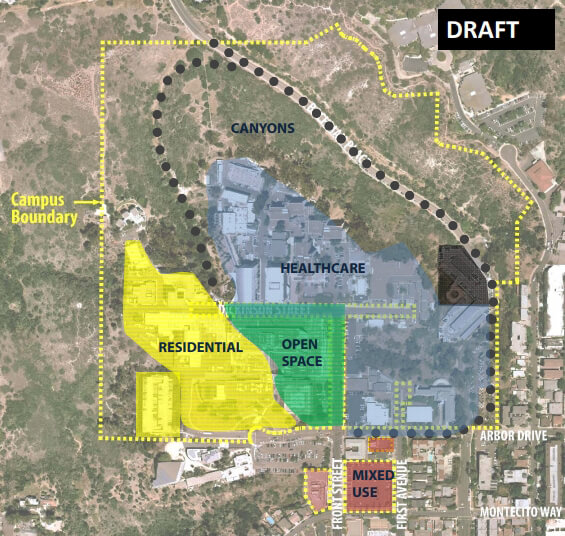Daily Business Report-April 29, 2019
The proposed layout for the new Long Range Development Plan to replace the current UC San Diego Hillcrest Medical Campus.
Long Range Development Plan prepared
for UC San Diego’s Hillcrest medical center
After six decades of add-on construction and expansions, UC San Diego is ready to replace its 11-story medical center in Hillcrest.
With aging infrastructure, updates in seismic regulations, and technological advances in acute health care and outpatient procedures, the university says it can no longer operate the campus in its existing condition.
UC San Diego hired architecture firm SmithGroup to lead a master planning effort to re-imagine the Wellness Campus in the 21st century—including the hospital and the entire 62-acre site.
After extensive community involvement and consultation, the resulting vision is a new Long Range Development Plan, which features districts for health care, housing, mixed-use, research, open space, and canyons. The plan calls for redeveloping roughly 34 acres of the 62-acre site with significant infrastructure upgrades, maintaining many of the view corridors and limiting the footprint of the development on the mesa.
A commitment to mass transit will connect the UC San Diego Wellness Campus in Hillcrest to other UC San Diego campuses in La Jolla and Downtown. The project will be constructed in five to seven phases, all while the hospital remains open, and will be completed in approximately 12 years.
The UC Board of Regents are expected to approve the plan and entitlement documents later in 2019, with the Phase 1 design currently underway and groundbreaking anticipated in summer 2020.
UC San Diego has operated a medical campus in the greater Hillcrest area that was originally constructed in 1963 as the County of San Diego Hospital.
_________________

Harsh judgment for antiquated commission
Dan Morain | CALmatters
California is a state of innovation and techies. But the commission responsible for disciplining California’s 1,800 judges persists in taking complaints solely in writing, delivered via mail.
The Commission on Judicial Performance rejects complaints sent by email, and there’s no way to submit complaints on its website, the Bureau of State Audits reports.
“Even if the [Commission on Judicial Performance] developed the capacity to accept online complaint submissions, it is unclear whether its case-management system could accept these complaints directly.”
The commission’s case-management system is 25 years old, and an information technology specialist position has been vacant since early 2014.
An outside consultant keeps the system operating, at a cost of $100,000 a year.
Among other findings, auditors said the Commission on Judicial Performance:
Ignored patterns of wrongdoing by certain judges.
Privately admonishes judges far more often that it issues public reprimands.
Closes three-quarters of the complaints without imposing sanctions.
Spends far too much money on rent for its spacious San Francisco office, and depends on paper and couriers to deliver packages to commissioners, rather than using email.
Fails to hold public meetings.
Most troubling: The audit noted the commission’s investigators failed to fully investigate allegations of misconduct in 11 of 30 cases reviewed by the auditor.
One investigator was told a judge made intimidating comments while on the bench that could have violated criminal law. However, the investigator never listened to audio files that could have proven or disproven the allegation.
_________________
USD Kroc School Institute announces
initiative to reduce violent conflict
The University of San Diego Kroc School’s Institute for Peace and Justice (Kroc IPJ) announced an initiative that will create an agile research infrastructure to accelerate and amplify global efforts to create better-funded, more effective peacebuilding. The Kroc IPJ’s Impact: Peace initiative aims to significantly reduce violent conflict worldwide.
Made possible by donor and member of the Peace and Security Funders Group Milt Lauenstein, who pledged a $1million commitment, the Impact:Peace Initiative will attempt to reverse the 30-year high in violent conflict the world is experiencing. “The human and economic cost of war is appalling! Efforts to limit armed conflict are fragmented and inadequate, with little hard evidence about where best to allocate resources,” said Lauenstein.” USD has established a challenge to raise additional funding beginning with a $1 million match.
The new initiative will kick off with a launch at USD on May 20-22.
_________________
GraphPad acquires Biomatters
to form life sciences software platform
GraphPad, a lprovider of data analysis and visualization software for the life sciences industry, announced that it will acquire Biomatters, a provider of Geneious DNA data analysis solutions. The acquisition creates a life sciences software platform with technology and data analysis at the core of scientific research around the world.
“The acquisition of Biomatters is an exciting opportunity to better serve our customers and the scientific community,” said Thomas Swalla, CEO of GraphPad. “There is a critical need for scientists and researchers to leverage technology in a way that enhances—not impedes—innovation.”
In 2017, GraphPad received an investment from Insight Partners, a global venture capital and private equity firm investing in high-growth technology and software companies.
Following the acquisition, both companies will continue to operate and serve customers under their respective brands.
_________________
San Diego State University
names new chief information officer

Jerry Sheehan, who holds more than 25 years of experience serving as an information technology executive in various sectors, has been appointed as San Diego State University’s new chief information officer. Sheehan, who currently serves as vice president and chief information officer at Montana State University, begins his appointment at SDSU on July 1.
In collaboration with SDSU leaders and stakeholders, Sheehan will be charged with advancing campus-wide information technology infrastructure developments and technology transformation across the university. Through this charge, Sheehan will ensure efficient deployment of stable, reliable, and secure technology infrastructure and systems.
At Montana State University, Sheehan provided leadership, oversight, management and strategic planning for the university’s information technology infrastructure. Sheehan holds extensive expertise related to all facets of information technology and security, particularly campus data networking and systems, web infrastructure, user support and learning technology.
_________________
Cubic recognized on Forbes America’s
Best Large Employers List for 2019
Cubic Corporation announced it has been listed on “America’s Best Large Employers” list by Forbes. Cubic ranked 103 out of 500 companies in the overall large employers list and ranked sixth out of 19 companies in the Aerospace and Defense industry category. Forbes, in partnership with market research company Statista, creates the annual ranking of America’s best employers based on an independent survey conducted on a vast sample of approximately 50,000 employees working for companies employing at least 1,000 people in their U.S. operations.
The 2019 list of “America’s Best Large Employers” includes the top 500 large companies, universities and government agencies across 25 industry sectors.
_________________

Sacramento Report: Gloria trying
to boost San Diego transit measure
By Sara Libby and Andrew Keatts | Voice of San Diego
A new bill by Assemblyman Todd Gloria would make it easier for the Metropolitan Transit System to pass a tax measure to expand public transportation across the region.
The bill, AB 1413, would let transit agencies across the state propose new taxes for a specific portion of the areas they cover, cleaving off tax-averse areas from both paying the tax and voting to approve it.
For MTS, which is already working to put a sales tax for transit on the 2020 ballot, that could mean sectioning off areas like Poway or Santee that voted disproportionally against the region’s last attempt to raise taxes for transportation in 2016. General tax increases require two-thirds voter approval, giving any pocket of no votes the chance to sink a measure.
Previous state legislation written by Assemblywoman Lorena Gonzalez gave MTS the ability to collect taxes in the first place. This bill is an effort to expand the scope of that law, said Gloria spokesman Nick Serrano.
“Some jurisdictions want tax increases to expand transit, and others don’t,” he said. “We should have a tool for the jurisdictions that do want it to be able to make that decision for themselves, so they can address specific needs.”
Serrano said they see the measure as a way to spur transportation investments at the local level across the state. As Gloria runs for mayor, he could end up sharing the November 2020 ballot with an MTS measure looking to do just that in San Diego.
Gloria’s office has been talking with MTS about the bill for the last year and half, Serrano said, since it first introduced a similar precursor bill before learning they needed to build more support for the effort.
Rob Schuup, a spokesman for MTS, said the agency is still developing a potential project list for its ballot measure, and will poll the entire area it serves on the popularity of those investments.
“It may turn out that certain areas of our jurisdiction will not be favorable toward a sales tax for transit,” Schupp wrote in an email. “While I believe MTS would prefer a measure that gets support from all areas of its service territory, AB 1413 provides flexibility.”
But it isn’t guaranteed that the bill, if passed, would come in time to make it easier for voters to approve MTS’s measure, Serrano said.
He said it’s possible the change wouldn’t apply to MTS’s measure because MTS has already started working to put something on the ballot.



